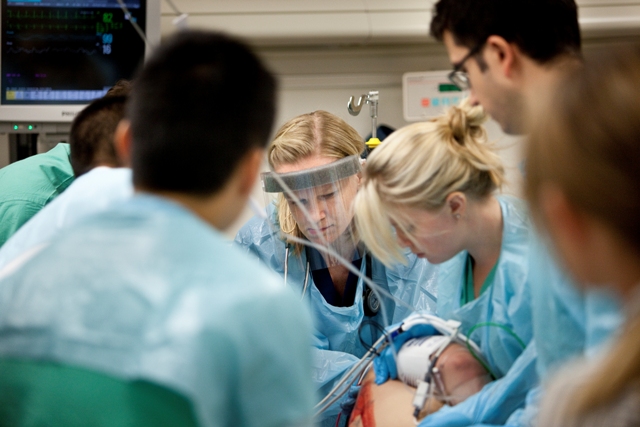Downtime in the Emergency Department
What can a Research Associate do when the Emergency Department is slow, and there are no patients to enroll?
Answer: A lot! Here are some essential tips to enlighten and keep you involved and interested while working in the Emergency Department during slow periods.
Heirarcy of each Emergency Department Area
- The Attending is the faculty physician in charge of the area. All residents and students must present their cases to the Attending. You should introduce yourself to each Attending when you start your shift so they know you're there. Ask if there are any patients to be enrolled in the various studies. Also be sure to ask if there are any procedures about to happen and if you can observe or help out in any way. Also ask the Area I Attending to be included on any resuscitations that come in.
- The Resident is the second in command. There are many different specialties (emeregency medicine, pediatrics, surgery, internal medicine) represented in the Emergency Department. Especially get to know the emergency medicine Resident during the shift. They will include you in procedures if you ask, and you can accompany them as they take care of patients. They are a great resource for tips on getting into medical school and what to expect as you progress in medicine.
- The Intern is in their first year of residency after graduating from medical school. They are third on the totem pole. They may have less time to interact with you, as well as limited autonomy.
- The Medical Student is rotating through the Emergency Department. They are good to get to know a they can tell you firsthand about medical school. They are the lowest denominator on the totem pole that is the Emergency Department.
- The Nurses are a vital component of the Emergency Department and wield great power. Always be respectful and polite to them, as they have a tremendously difficult job and are often extremely busy. Realize their powers of observation are supernatural, and they will notice what you are doing and at times will call you on it.
- The Emergency Department is also home to Technicians, Social Workers, Janitors, Volunteers, Paramedics, Firefighters, Police, CHP, Friends and Family of patients, and many others. It is truly a mixing bowl of people and personalities. Be friendly and outgoing, and you will find this behavior will be mirrored the majority of the time.
So in summary...
- Introduce yourself liberally and ask to observe and help out with any procedures or resuscitations.
- Get to know the residents and students and ask to accompany them as they see patients and get things done.
- If you are curious about learning more regarding the pathophysiology of illness and trauma in the patients with whom you are involved in the Emergency Department, always feel free to ask the attending, resident, or medical student working with the patient. Remember, UC Davis Medical Center is an academic medical center that emphasizes teaching, and you are part of the team. There will be times when the Emergency Department is very busy, and this may not be possible.
- Visit the links in the Resources section of the website and read up on what you encounter in the Emergency Department.
Keep in mind you may also encounter different personality types who may not be open to teaching or interacting with Research Associates. Don't take it personally, but be persistent and ask someone else, as these individuals are a minority in our Emergency Department. If an Attending or Resident is particularly unhelpful or rude to you, please make a note of it and forward it anonymously by leaving it in the EMRAP mailbox in Area I (where the key is located). We want you to have a excellent and positive experience during your tenure as a Research Associate.

